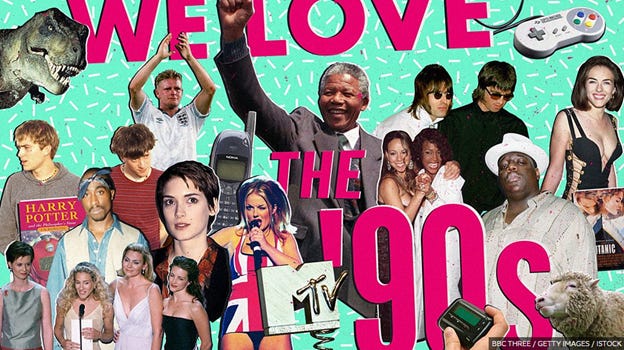I am technically a 90s baby, born at the dawn of what is sometimes referred to as the greatest decade. I remember getting our first computer in the 90s. Playing with my parent’s brick of a cell phone. And reading TV guide to see what time my favorite shows started.
But being born in the 90s, I was very young when all the 90s culture was happening in the way that is memorable. What I remember culturally – when I was coming of age as an adolescent – was the 2000s. The 1990s is really the decade of Gen Xers as they were coming of age.
Me being born in the awkward moment of being too young to embrace the 90s full force but still being a kid of that decade made Chuck Klosterman’s, The Nineties: A Book, interesting. Though nostalgic for some of the simplicities of childhood, I also felt that I had missed out – a few years too young to fully know and be of the 90s.
What stood out to me was how truly transformational the 90s were as a decade. As Klosterman states, “It was a remarkably easy time to be alive.” It was relatively peaceful on the world stage, and if it wasn’t we had the valid option of not caring. We weren’t glued to our internet or cell phones and could just be in our day without endless scrolling. We could choose to use technology, but it wasn’t central to our lives.
By the end of the decade the balance had shifted. I think the role of technology in daily lives was a fundamental change that the 90s will be known for, on par with how we now view the industrial revolution.
The Nineties focuses a lot on the role of technology, how culture shifted as a result, the type of entertainment we consumed, a bit of politics, and just how people were in that time. As the 2020s I’m sure will be known for “the influencer”, the 90s was known for its “grunge”. Again, an era I wish I was old enough to partake in as a teen.
The book gave me good insight into the things that I was too young to consume, appreciate, or care about as a 90s kid. But I couldn’t help but feel like the book wasn’t for me. The book is for Gen Xers. The 90s is the era of Gen Xers, a time when they were coming of age, in their prime, and the center of the cultural stage. Reading it was like being in a social group that you definitely don’t belong in, and everyone knows it but is too nice to say anything to you.
Overall, it’s a good book. Klosterman’s writing is humorous, detailed, and engaging. Most of the content I had context or experience with in some capacity, but some of the music and film held little interest for me. If you’re a Gen Xer definitely read it. Everyone else will get interesting information, but it’s not your book.
Published: February 2022
Format: Hardcover
If you think this sounds interesting, bookmark these other great reads:
Come Fly The World: The Jet-Age Story of the Women of Pan Am by Julia Cooke (2022)
Capote's Women: A True Story of Love, Betrayal, and a Swan Song for an Era by Laurence Leamer (2021)
We Are the Nerds: The Birth and Tumultuous Life of Reddit, the Internet's Culture Laboratory by Christine Lagorio-Chafkin (2019)
This post contains affiliate links, allowing me to earn a small commission when you purchase books from the link provided. There is no cost to you, and this will allow me to keep this newsletter free and open to all. Happy reading!






I was browsing r/nosurf the other day (it's for quitting the internet), and someone posted about the 90s - emulating the balance of using technology without it using us. It's certainly an interesting idea, and it ties back with what your review mentions. I will give the book a go, thanks for the suggestion.
On a similar note, I was wondering if there exists a similar "biography" of gen Z. How they think, why and what will happen with this generation in the future. I have the terrible misfortune of being gen Z, so gaining some perspective on that would be useful.
Either way, excellent review. Thanks!
Interesting. I was born in the 80's and came of age in the 90s. I was never a big fan of my generation back then, I was one of those old lefties who missed the idealism of the 60s/70s generation and lampooned the selfish narcissism and, what I felt was the apathetic fatalism of my generation. Admittedly, I didn't have the happiest childhood, so that coloured my perceptions.
I never thought I'd be that nostalgic for the 1990s, and I do think we are now paying a price for our hubris then, but some of the trends in youth culture today really make me reappraise the 1990s. The young activists of today cause me to miss the culture of indifference that characterized the 1990s. And I've moved a lot politically since those days. Now that I have children of my own I'm trying to instil resilience in them, given the pervasiveness of victimhood in woke culture. But, I also know that I'm getting on, and some of my issues with contemporary YA culture is probably just the detritus of age.